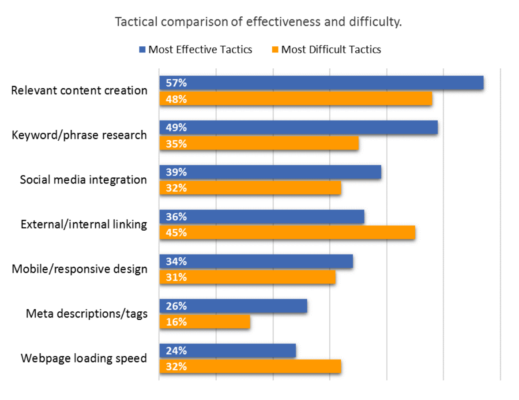Keywords are crucial to your SEO success because they enable you to direct searchers towards the products and services you provide on your website and through your brand. Without a series of relevant keywords attached to your website, you may miss out on the opportunity to attract users who are likely to convert to active buyers if they did come across your website. So, as a way of directing them there, from a ‘keyword’ perspective, the first step would be to identify what your target audiences are searching for, and then use keywords that are connected to those directed queries.
Keywords and Customer Personas
How do you bolster your keyword pile? Easy: conduct keyword research. According to a survey from Ascend2, one third of respondents reported that ‘keyword research’ was one of their top SEO tactics:

Sometimes an effective way of identifying relevant keywords is to look at the common traits of your consumers. Consider the following: if you are an online cosmetics business, and most of your purchasers are middle-aged women who live in New York City, you are in a better position to identify what those consumers will search for if you know those demographics. Different demographics may all want the same shade of lipstick, but how they get there varies; some may search for “best lipstick,” “red lipstick,” or “lipstick shades for older women”. Developing customer personas will help your business create more targeted ads by tracking who finds your product and how.
You can use tools like Google Analytics, or social media platforms like Twitter Analytics or Facebook and Instagram Insights to learn more about your customer demographics. Whichever way you choose to obtain this information, acquiring it puts you in a better position to find keywords that match the probable queries of your target audiences.
Look at your most used keywords to track if your website content matches up to what your customer personas are searching for.
Previously Searched for Keywords
Another effective method of keyword research is to identify what previous consumers have searched for as they made their way to your website. Searches naturally narrow as people acquire more information about their queries or are looking for something specific. For example, if someone is looking for affordable cars, they may make this query originally, then come to the conclusion that they are more interested in renting a car in a certain region. If you own a car rental shop in this region, using keywords related to these broader searches can direct prospects at an earlier time when they are less distracted with other websites. The KeyWord tool dominator is one such tool that would allow you to do this.
In the case you also take a paid ad route, you are at an advantage because you are using two channels that together yield greater results than organic search alone and you have the opportunity to evaluate what types of keywords generate greater success with your ads. Identifying the types of keywords attached to your most successful ads can help you get a better idea of what users are searching for when they are in the market for your products and services.
When running paid ad campaigns, don’t forget to analyze the performance of your keywords to ensure each campaign is a success. This will also help you improve future campaigns.
Researching the different paths to purchases from all your customers will broaden your keyword list for each and every product.
It may seem like a rather complex process, but it gets easier over time. And the best part? With each campaign, you add more successful keywords to your overall list, continually growing your base target.


